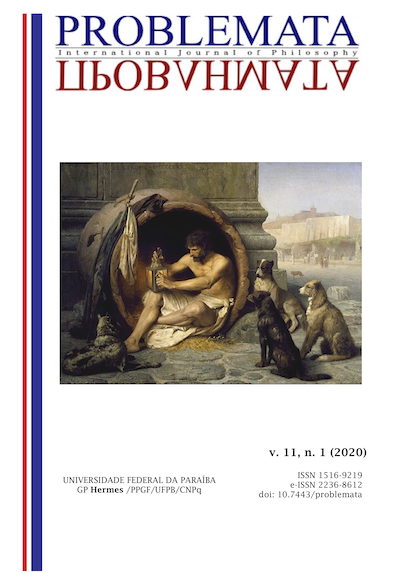IMPLICATIONS OF THE TECHNIQUE OF EXISTENCE [TECHNISIERUNG DES DASEINS] IN HANNAH ARENDT AND HANS JONAS
DOI:
https://doi.org/10.7443/problemata.v11i1.46447Keywords:
Hannah Arendt, Hans Jonas, Politics, Ethic, Technification of Existence [Technisierungdes Daseins]Abstract
The present article aims to analyze the implications of the modern technique that make human existence technically possible. Our analysis is based on the works of Hannah Arendt and Hans Jonas, establishing a dialogue between the two. Through the numerous stages of development of technique and technology, from the seventeenth century onwards we perceive a dependence and subordination of human beings to technology. This threatens the freedom and human integrity of future generations, and confers on a totally postmodern phenomenon that we will call technification of existence [Technisierungdes Daseins], coined by Arendt in July 1954, in his dairy, Denktagebuch. In these terms, we will first analyze how Hannah Arendt understands such phenomena, presenting the steps of technique and technology, its consequences, and what there is political output; in a second moment, from the perspective of Hans Jonas, we will explore the author's contributions on the effects of technology in contemporary society, and explain how his ethical principle of responsibility has the capacity to restrain technological impulses. Finally, after these analyzes, we can affirm that only a policy and an ethics aimed at human interests, are able to face the dangers contained in technology and to safeguard humanity.
Downloads
References
ARENDT, H. (1958) “A condição humana”. Trad. Roberto Raposo. Rev. técnica Adriano Correia. 11. ed. Rio de Janeiro: Forense Universitária, 2010.
______. (1994) “Compreender”: formação, exílio e totalitarismo (ensaios) 1930-54. Trad. Denise Bottmann. Org. Introd. e Notas Jerome Kohn. São Paulo: Companhia das Letras; Belo Horizonte: Editora UFMG, 2008.
______. “Denktagebuch”. Bd. 1: 1950-1973. Bd. 2: 1973-1975.Piper, 2002.
______. (1987) Trabalho, Obra, Ação. Trad. Adriano Correia. Rev. TheresaCalvet de Magalhães. “Cadernos de Ética e Filosofia Política”, pp. 174-201, 2/2005.
CAMARGO, L. N. “Transumanismo”: desafios e perspectivas para a filosofia contemporânea. In.: GOUVEIA, S. S.; SOL, A. F. (Orgs.). “Bioética no século XXI”.1ª Ed. Charleston: CreateSpaceIndependentPublishing, pp. 415-429, 2018.
CORREIA, A.“Hannah Arendt e a modernidade”: Política, economia e a disputa por uma fronteira. Rio de Janeiro: Forense Universitária, 2014.
HEIDEGGER, M. (1953)“A questão da técnica”. Trad. Marco Aurélio Werle. “ScientiaeStudia”, São Paulo, v.5, n.3, p.375-398, 2007.
HÖLDERLIN, F. (1922) “SämtlicheWerke”. 6 Vol. Stuttgart: Kohlhammer, 1954.
JONAS, H. Actuar, conocer, pensar. La obra filosófica de Hannah Arendt. In.: BERTRÁN, J. B. “Hannah Arend”t:elorgullo de pensar. Barcelona: Gedisa, 2000, pp. 23-40.
______. (1992) O fardo e a benção da mortalidade. “Princípios”, Natal, v. 16, n.25, jan.-jun./2009, p. 265-281. Tradução de Wendell Evangelista Soares Lopes. Disponível em: <https://periodicos.ufrn.br/principios/article/view/450>. Acesso em: 20 jan. 2015.
______. (1979) “O princípio responsabilidade”:ensaio de uma ética para a civilização tecnológica. Tradução de Marijane Lisboa e Luiz Barros Montez. Rio de Janeiro: Contraponto, Ed. Puc-Rio, 2006.
______.(1966) “O princípio vida”: fundamentos para uma biologia filosófica. Tradução Carlos Almeida Pereira. Petrópolis: Vozes, 2004.
______. (1992) “Pensar sobre Dios y otros ensayos”. Tradução Angela Ackermann. Barcelona: Herder, 1998.
______.(1985) “Técnica, Medicina e Ética”:sobre a prática do princípio responsabilidade. Tradução Grupo de trabalho Hans Jonas da ANPOF. São Paulo: Paulus, 2013.
MAGALHÃES. T. C. Ação e pensamento em Hannah Arendt. “Filosofia do direito e o tempo”. Juiz de Fora: Editar, pp. 1-09, 2011.
OLIVEIRA, J. R. O homo faber: de usuário de ferramentas a objeto tecnológico.“Educação e Filosofia”, v.30, n.59, p.331-351, jan./jun. 2016.
POMMIER, E. Ética e Política em Hans Jonas e Hannah Arendt.“Revista de Filosofia Aurora”, Curitiba, v. 28, n. 43, pp. 227-248, jan./abr. 2016.
Downloads
Published
Issue
Section
License
Authors who publish with this journal agree to the following terms:
- Authors retain copyright and grant the journal right of first publication with the work simultaneously licensed under a Creative Commons Attribution License that allows others to share the work with an acknowledgement of the work's authorship and initial publication in this journal.
- Authors are able to enter into separate, additional contractual arrangements for the non-exclusive distribution of the journal's published version of the work (e.g., post it to an institutional repository or publish it in a book), with an acknowledgement of its initial publication in this journal.
-
- Authors are permitted and encouraged to post their work online (e.g., in institutional repositories or on their website) prior to and during the submission process, as it can lead to productive exchanges, as well as earlier and greater citation of published work (See The Effect of Open Access).





